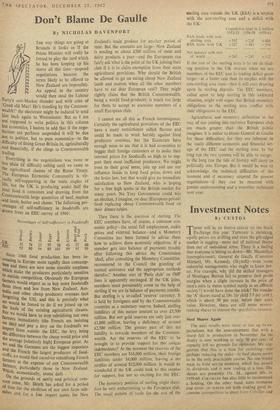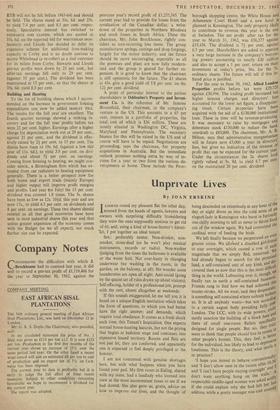Investment Notes
By CUSTOS
FTHERE will be no festive season on the Stock I Exchange this year. Turnover is shrinking, equity prices are drifting and even the gilt-edged market is sagging—more out of national shame than out of individual sense. There is a feeling that everyone is letting us down—Mr. Macmillan (unemployment), General de Gaulle (Common Market), Mr. Kennedy (Skybolt)—even some industrial managements who ought to know bet- ter. For example, why did the skilled managers of Montague Burton fail to preserve their profit margins when a slight increase in the price of men's suits (a status symbol surely in an affluent society?) would have done the trick? No wonder the 'A' shares stand at 18s. (to yield 3.9 per cent.), which is about 30 per cent. below their asset value. However, there are still some money- making shares to interest the speculative investor.
Steel Shares Again
The steel results were more or less up to ex- pectations, but the announcement that with a sharp fall in production in November the in- dustry is now working at only 70 per cent. of capacity left no grounds for optimism. My sug- gestion that this is a time for switching— and perhaps reducing the stake--in steel shares seems to be the only practicable course. No one would want to hold SOUTH DURHAM; which has passed its dividends and is now trading at a loss. The shares are presently I Is. 3d., against 60s. in 1959-60. COLVILLES has also little to recommend a holding. On the other hand, JOHN SUMMERS and STEEL OF WALES are both making good re- coveries (competition in sheet from C'olvilles and RTB will not be felt before 1963-64) and should be held. The shares stand at 31s. 6d. and 25s. to yield 7.4 per cent. and 8.1 per cent. respec- tively. Speculative interest has switched to STEWARTS AND LLOYDS, which are quoted at 35s. 6d. on the reported bid for WHITEHEAD IRON. Stewarts and Lloyds has decided to defer its expensive scheme for additional iron-making capacity at Corby and is no doubt anxious to secure Whitehead (a re-roller) as a tied customer for its billets from Corby. Stewarts and Lloyds pre-tax profits were down by 23 per cent., but after-tax earnings fell only to 29 per cent. (against 35 per cent.). The dividend has been maintained at 15 per cent., so that the shares at 35s. 6d. yield 8.3 per cent.
Building and Heating
To the list of building shares which I recom- mended on the increase in government housing expenditures can now be added MARLEY TILE. The results for the full year are excellent. The fourth quarter earnings showed a striking re- covery and for the full year profits before tax were 22 per cent. higher. Earnings after a higher charge for depreciation work out at 29 per cent., against 21 per cent., and the dividend is effec- tively raised by 2f per cent. to 15 per cent. The shares have risen to 19s. 6d. (against a low this year of its. 6d.), to yield 3.9 per cent. on divi- dends and about 71 per cent. on earnings. Coming from housing to heating, we might con- sider SERCK, a Birmingham firm which has ex- tended from car radiators to heating equipment generally. There is a better prospect now for both home and export trade (mainly Europe) and higher output will improve profit margins and profits. Last year (to July) the 15 per cent. dividend was covered 1.8 times. The Ss. shares have been as low as 12s. 101d. this year and are now 17s., to yield 4.3 per cent. on dividends and 8 per cent. on earnings. These two shares should remind us all that good recoveries have been seen in most industrial shares this year and that unless greater expansion of the economy comes with the Budget (as we all expect), not much further rise can be expected.





























 Previous page
Previous page